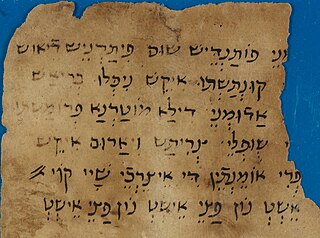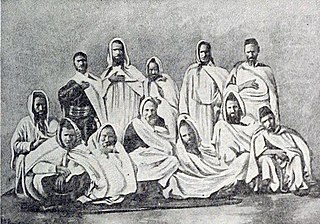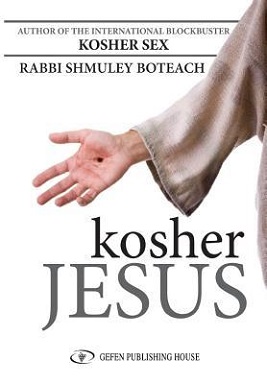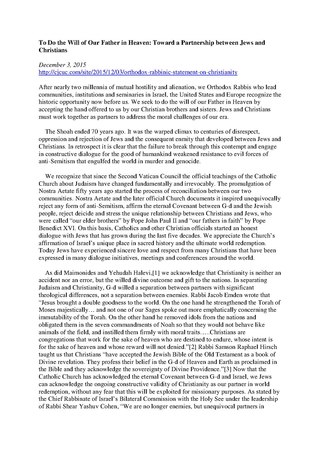Christianity began as a movement within Second Temple Judaism, but the two religions gradually diverged over the first few centuries of the Christian era. Today, differences of opinion vary between denominations in both religions, but the most important distinction is Christian acceptance and Jewish non-acceptance of Jesus as the Messiah prophesied in the Hebrew Bible and Jewish tradition. Early Christianity distinguished itself by determining that observance of halakha was not necessary for non-Jewish converts to Christianity. Another major difference is the two religions' conceptions of God. Depending on the denomination followed, the Christian God is either believed to consist of three persons of one essence, with the doctrine of the incarnation of the Son in Jesus being of special importance, or like Judaism, believes in and emphasizes the Oneness of God. Judaism, however, rejects the Christian concept of God in human form. While Christianity recognizes the Hebrew Bible as part of its scriptural canon, Judaism does not recognize the Christian New Testament.

Judaism is an Abrahamic monotheistic ethnic religion that comprises the collective spiritual, cultural, and legal traditions of the Jewish people. Religious Jews regard Judaism as their means of observing the Mosaic covenant, which was established between God and the Israelites, their ancestors. The religion is considered one of the earliest monotheistic religions in the world.
The term Judeo-Christian is used to group Christianity and Judaism together, either in reference to Christianity's derivation from Judaism, Christianity's recognition of Jewish scripture to constitute the Old Testament of the Christian Bible, or values supposed to be shared by the two religions. The term Judæo Christian first appeared in the 19th century as a word for Jewish converts to Christianity. The term has received criticism, largely from Jewish thinkers, as relying on and perpetuating notions of supersessionism, as well as glossing over fundamental differences between Jewish and Christian thought, theology, culture and practice.
Antisemitism and the New Testament is the discussion of how some Christians' views of Judaism in the New Testament have contributed to discrimination against Jewish people throughout history and in the present day.

Jews for Jesus is an international Christian missionary organization headquartered in San Francisco, California, that is affiliated with the Messianic Jewish religious movement. The group is known for its proselytism of Jews and promotes the belief that Jesus is the Christ and the Son of God. It was founded in 1970 by Moishe Rosen as Hineni Ministries before being incorporated under its current name in 1973.

Messianic Judaism is a syncretic Abrahamic new religious movement that combines various Jewish traditions and elements of Jewish prayer with Evangelical Protestant theology. It considers itself to be a form of Judaism but is generally considered to be a sect of Christianity,, including by all major groups within mainstream Judaism, since Jews consider belief in Jesus as the Messiah and divine in the form of God the Son to be among the most defining distinctions between Judaism and Christianity. It is also generally considered a Christian sect by scholars and other Christian groups.

Ebionites as a term refers to a Jewish Christian sect that existed during the early centuries of the Common Era, whose name may have been taken from the first group of people mentioned in the Beatitudes of Jesus as blessed and meriting entry in the coming Kingdom of God on Earth.
Christian−Jewish reconciliation refers to the efforts that are being made to improve understanding and acceptance between Christians and Jews. There has been significant progress in reconciliation in recent years, in particular by the Catholic Church, but also by other Christian groups.

The Judaizers were a faction of the Jewish Christians, both of Jewish and non-Jewish origins, who regarded the Levitical laws of the Old Testament as still binding on all Christians. They tried to enforce Jewish circumcision upon the Gentile converts to early Christianity and were strenuously opposed and criticized for their behavior by the Apostle Paul, who employed many of his epistles to refute their doctrinal positions.

Judeo-Latin is the use by Jews of the Hebrew alphabet to write Latin. The term was coined by Cecil Roth to describe a small corpus of texts from the Middle Ages. In the Middle Ages, there was no Judeo-Latin in the sense of "an ethnodialect used by Jews on a regular basis to communicate among themselves", and the existence of such a Jewish language under the Roman Empire is pure conjecture.
The Catholic Church and Judaism have a long and complex history of cooperation and conflict, and have had a strained relationship throughout history, with periods of persecution, violence and discrimination directed towards Jews by Christians, particularly during the Middle Ages.

Berber Jews are the Jewish communities of the Maghreb, in North Africa, who historically spoke Berber languages. Between 1950 and 1970 most emigrated to France, the United States, or Israel.
Hellenistic Judaism was a form of Judaism in classical antiquity that combined Jewish religious tradition with elements of Hellenistic culture and religion. Until the early Muslim conquests of the eastern Mediterranean, the main centers of Hellenistic Judaism were Alexandria in Egypt and Antioch in Turkey, the two main Greek urban settlements of the Middle East and North Africa, both founded in the end of the 4th century BCE in the wake of the conquests of Alexander the Great. Hellenistic Judaism also existed in Jerusalem during the Second Temple Period, where there was a conflict between Hellenizers and traditionalists.
Anti-Judaism in Early Christianity is a description of anti-Judaic sentiment in the first three centuries of Christianity; the 1st, 2nd, and 3rd centuries. Early Christianity is sometimes considered as Christianity before 325 when the First Council of Nicaea was convoked by Constantine the Great, although it is not unusual to consider 4th and 5th century Christianity as members of this category as well.

Jacob Bernard Agus was a Polish-born American liberal Conservative rabbi and theologian who played a key role in the Conservative Rabbinical Assembly.
Jewish polemics and apologetics in the Middle Ages were texts written to protect and dissuade Jewish communities from conversion to Christianity, or more rarely to Islam. The terms polemics and apologetics may be distinguished but may also be considered somewhat subjective. A smaller number of proselytizing text also exists intended to convert Christians, or more rarely Muslims, to Judaism. However, the vast majority of Jewish polemical literature was written in response to Christian polemical writings and with a permanent reference to Christian arguments.

Kosher Jesus (2012) is a book by the Orthodox Rabbi Shmuley Boteach, focusing on the relationship between Christianity and Judaism. The book examines the rabbinic origins of the teachings of Jesus within the context of Second Temple Judaism in the 1st century and the New Testament, and compares scholarly views on the historical figure of Jesus with the theological ideals expressed by the Jewish writers of early rabbinic literature.
Judaeo-Christian ethics is a supposed value system common to Jews and Christians. It was first described in print in 1941 by English writer George Orwell. The idea that Judaeo-Christian ethics underpin American politics, law and morals has been part of the "American civil religion" since the 1940s. In recent years, the phrase has been associated with American conservatism, but the concept—though not always the exact phrase—has frequently featured in the rhetoric of leaders across the political spectrum, including that of Franklin D. Roosevelt and Lyndon B. Johnson.

To Do the Will of Our Father in Heaven: Toward a Partnership between Jews and Christians is the Orthodox Rabbinic Statement on Christianity published by the Center for Jewish–Christian Understanding and Cooperation (CJCUC) in 2015. It was initially signed by over 25 prominent Orthodox rabbis in Israel, United States, and Europe, and now has over 60 signatories.

Dan Jaffé is a Franco-Israeli specialist in the history of religions and teaches at Bar-Ilan University (Tel-Aviv) and Ashkelon Academic College. He is a researcher attached to the CNRS. His work focuses on the Jewish world in the first centuries of the Common Era, the Talmud and the origins of Christianity. He has published extensively on relations between Rabbinic Judaism and Early Christianity. He directs the collection Judaïsme ancien et christianisme primitif published by Éditions du Cerf.








